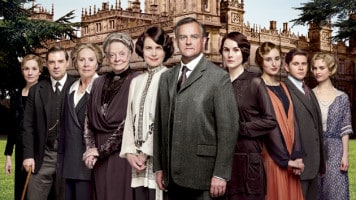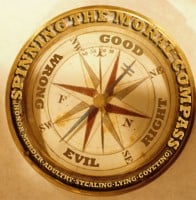Podcast: Play in new window | Download
Subscribe: RSS

(Author’s note: This post originally appeared in January 2013. It was part of a series about the huge changes that are rocking Western society – and their impact on men and the church. I am not advocating these changes; I’m simply trying to explain why they’re happening, to help believers respond with greater understanding to those they may disagree with.)
I’m one of the millions of viewers enchanted by one of TV’s hottest show – Downton Abbey. It’s the story of an aristocratic family and their servants, set in England a century ago. (Guys, I know it sounds boring, but it’s actually terrific.)
Downton takes us inside a society built on formality. Every human interaction is carefully scripted. There’s proper dress for every occasion. Dinner must be served an exact way. Conversations are diplomatic and indirect. People control their passions and lusts (for the most part). Manners matter. Duty reigns supreme. The characters consistently do what they think is right, even if it costs them everything.
But as the show progresses through the 1910s and 20s, the formal society slowly fades, yielding to the informal world we know today.
The Crawley family would not recognize the world we live in. There are no formal class distinctions. We say whatever we want. We rarely dress for any occasion. Manners matter little. We indulge ourselves. Etiquette, social conventions and duty have taken a backseat to familiarity, convenience and practicality. We celebrate the exploits of those who lack self-control.
Let me be clear: I do not mourn the passing of the Edwardian era. I see little value in changing clothes six times a day, following traditions that have lost all meaning, or beating about the bush. The servant-and-master model has run its course, and good riddance.
But I am curious as to why our world became so informal so fast. Why, even in my lifetime I’ve seen people stop dressing for all but the most solemn occasions. Why so many aspects of politeness have gone by the wayside. Why expediency almost always trumps “doing the right thing.”
Downton Abbey is so unusual because it runs counter to the informal, anti-institutional bias that’s been the lifeblood of television since the 1970’s. Hit comedies such as M*A*S*H, All in the Family, The Simpsons and Seinfeld and won huge ratings by lampooning long held social norms. Meanwhile, TV dramas (viewer discretion advised) have been busy desensitizing audiences to mayhem, cruelty and unrestrained passion.
Then an uptight drama like Downton Abbey dominates the ratings. What gives?
I believe the success of Downton reflects a longing among Westerners for a more genteel, controlled era. Downton represents a time when the lines were bright and the penalties for stepping outside them were severe. Such rules may seem oppressive or silly to us, yet they fostered the peaceful, prosperous, liberal society we enjoy today. Only God knows how many of these rules can fall before our society falls as well.
And speaking of liberal, how is it that Downton has found an audience on PBS? Among its most ardent fans are the very counter-culturists who spent their youths rebelling against the oppressive social rules Downton celebrates. At some level liberals must realize the government they lionize cannot exist in a world with no cohesion. Someone has to maintain the institutions that make the welfare state possible.
One more thing Downton offers that almost no other show does – morally upright male characters. Lord Grantham and his heir, Matthew Crawley, are men of impeccable integrity. Their servants, Mr. Carson and Mr. Bates are equally principled. It’s been a long time since a TV drama offered such an array of kind, noble men in the lead roles. (Meanwhile, the show’s bad guy is a vindictive, devilish homosexual. Why liberals aren’t screaming about that plot element is a mystery to me.)
Lord Grantham, the patriarch, does his best to stand firm as the first waves of modernity begin washing away the foundations of the old agrarian order. (Spoiler alert: If you haven’t watched the show, don’t read the rest of this paragraph). His youngest daughter breaks social ranks and marries one of the servants. His eldest daughter has a one-night stand that threatens to bring disgrace on the family. And his middle daughter learns to drive a car and becomes a suffragette.
Lord Grantham objects vehemently as his daughters begin dismantling the cultural framework that underpins their noble status. Yet even as his children reject his ways, he does not reject them. Grantham is a true Christ figure – a loving father, a generous provider and a fierce advocate for his children. He clings to traditions not for traditions’ sake, but because he believes that’s what is best for his daughters, and for the world.
That Downton Abbey is so popular tells us something about modern viewers. We long for men like Lord Grantham, Matthew, Carson and Bates. Our anything-goes generation is looking for limits. As the baby boomers age, that old agrarian ethos is looking better and better.
As C. S. Lewis said, the basic moral law is written on our hearts. We don’t really want to be our own gods. We’re like toddlers – eventually we tire of being in charge and we long to submit ourselves to a higher power that will take care of us and tell us what we’re supposed to do. We want a Lord in our lives who will look after us – whether his name is Grantham or Jesus.
The Gospel grants us freedom and autonomy – but it also provides a framework in which the followers of Jesus are supposed to live. Such a framework may seem oppressive in our choice-driven age. As Christians, we don’t always understand why God tells us to do certain things, but we walk by faith — not by sight. We do as our Lord commands, whether we understand or not.
Rather than weaken this framework (as some churches are doing in the name of “inclusiveness”) we would do well to maintain it. Obedience to God is not oppression – it’s the only way to experience true freedom. Like Lord Grantham, we must object vehemently when truth is compromised, while at the same time responding with love to all of God’s children.